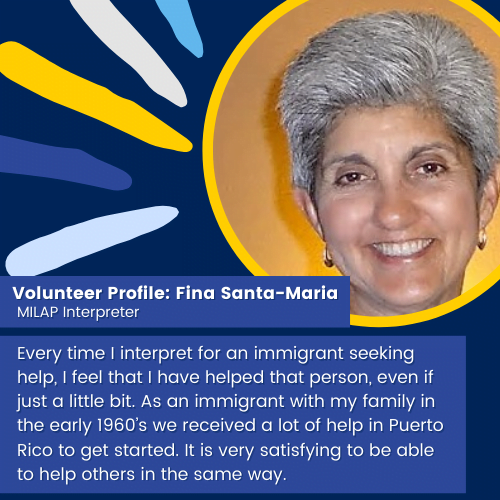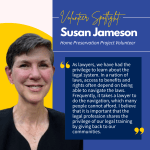Volunteer Profile: Fina Santa-Maria
 Can you tell me a little about yourself?
Can you tell me a little about yourself?
I am originally Cuban. My parents took us out of Cuba in 1960, fleeing from the Cuban Revolution and the lack of freedom that resulted from it. I grew up in Puerto Rico, so my first language is Spanish, but I learned English from about the fourth grade and up. I graduated from the University of Maryland with a degree in Chemistry, but I quickly realized that I was more interested in computer system design and programming and started my career with IBM. Most of my career was spent in the development, implementation, and support of hospital-based systems. Since 2017, I have been retired.
How did you get involved with the Maryland Immigrant Legal Assistance Program (MILAP)?
I was looking for opportunities to interpret as a volunteer and found MILAP as I searched on the internet.
What do you do with MILAP?
I interpret for Spanish-speaking clients who do not communicate well in English and the attorneys assisting them in the MILAP brief advice clinics. These clinics used to be held in-person in the immigration court building, but we have been doing them remotely via video calls since the pandemic started.
Is there a moment or a memory that stands out for you?
Not really a particular moment, but rather the overwhelming hope and strength that all these individuals display even as they recount the difficult and sometimes horrific events that caused them to leave everything they hold dear for a better life in the United States.
What do you find interesting or rewarding about your volunteer work?
I think it is critical that I interpret everything that is said by both parties. Sometimes, it is not clear to me what the client is really trying to say, and I need to ask them a few questions to clarify their statement. Then I can interpret it more clearly for the attorney. It is very rewarding for me to ensure that both the attorney and the client can communicate thoroughly and clearly.
What do you find frustrating about your volunteer work?
As an immigrant myself, I find it frustrating and sad that these immigrants who have worked so hard to get here and to support their families might not be able to stay.
How has the COVID-19 outbreak impacted your volunteer work, if at all?
After a few months during which all my volunteer work was shut down, some of it started up again, but in a different form. MILAP clinics started using video calls and my work tutoring adult education students also restarted but via Zoom calls.
How does remote volunteering compare with in-person volunteering?
As an interpreter, it helps to be able to watch a person’s body language as well as listening to their words when trying to understand what they are trying to say. This is harder to do when interpreting through a video call instead of in person.
What motivates you to continue volunteering?
Every time I interpret for an immigrant seeking help, I feel that I have helped that person, even if just a little bit. As an immigrant with my family in the early 1960’s we received a lot of help in Puerto Rico to get started. It is very satisfying to be able to help others in the same way.
What advice would you give to others who are considering volunteering their skills?
I would advise that interested volunteer definitely try doing it a few times. It is interesting and rewarding!
For more information about volunteering in Maryland, please contact: education@probonomd.org






